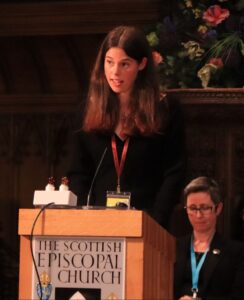The afternoon session of Day One of General Synod 2024 featured a significant change from recent years when the Provincial Youth Committee presentation was brought forward from its usual Saturday morning slot, to allow Synod members to hear the concerns and hopes of the Church’s young people before the bulk of Synod business has been completed.
Phoebe Pryce, Chair of the PYC, told members: “We are not a group which tends to bring motions or debates to General Synod, but we do have ideas and opinions on things that you as General Synod make decisions about.
“We are still here to share our experiences and tell our stories, but we are also here today to share our thoughts and our opinions on some of the topics you are discussing later in the agenda. We hope that through being here today, you can gather from us where our views lie on these issues, and that you will bear them in mind as you go forward in the next few days.”
Ms Pryce, pictured right, then told the story of Lucy, a 12-18 representative from the Diocese of St Andrews, Dunkeld and Dunblane, ahead of Motion 14 on nuclear weapons. Her opinion echoes the views of youth representatives that nuclear weapons are “highly dangerous and immoral, having the capacity to kill millions if they were ever used, potentially without solving underlying issues”.
Ms Pryce said: “Lucy’s question to you is this: ‘Why is there such investment in the building and maintenance of unethical and illegal weapons when that same money could be invested in other projects and make a real and positive difference to people’s lives?’
“Lucy voices the views of the whole PYC in encouraging you to take a decisive stance against nuclear weapons: we believe it would show that, as a community, the SEC is against the use of these incredibly destructive and immoral weapons. Whilst passing such a motion may not have an immediate effect upon our country’s nuclear programme, we think it’s important to show that we do not agree with the production, storage, and potential use of nuclear weapons in the UK, and across the world. Please consider this decision as one of human decency, morality and ethics, which reflect the Christian values of peace, compassion, and universal love that we strive to live by.”
The PYC weas also represented by Jadon Rongong, who focussed on the importance of the availability and awareness of defibrillators in our communities, and Felina Hamilton, who described her experiences of the curiosity that young people have about church and faith, and how such people can be welcomed into church lives and communities.
Concluding the PYC session, Ms Pryce said: “I look around the world today and I am scared. I am growing up in a society facing the impact of the cost of living crisis, of COVID, of Brexit. I’m watching millions of people just like me die every day in conflicts around the world. I am a young woman growing up in a world that feels to be taking steps backwards on women’s choices, freedoms and safety, and where my future on this Earth as we know it still seems to hang in the balance. I am scared. And while I do not have time to go into all of these anxieties, I ask that as you move forward in discussions and debates, you keep in mind the world you want your children and grandchildren and great-grandchildren to inherit. I hope you share my vision for one of justice, equality and peace.”
Earlier, Synod heard an update on progress towards Net Zero 2030. Over the past year, the main achievement has been the recruitment of a Net Zero Team at provincial level, giving direct support to dioceses as congregations move towards reducing carbon emissions.
The creation of a Net Zero Portal – a one-stop-shop for Net Zero advice, resources and queries – was highlighted to Synod members, followed by an excellent case study of the heathack workshop resource at St Mary’s Dalkeith. Rev Dr Val Cameron gave a clear and coherent guide to the heathack process, which included the startling detail that it took 12 hours for the church to cool down after it was heated for use. “What a waste of energy,” said Dr Cameron.
A walk-through of the building to analyse insulation and heating issues was followed by consultation and engagement with the congregation, and the measures subsequently implemented at St Mary’s at a cost of £500 should result in savings of £2,000 on the annual gas bill.
“The heathack process was easy and straightforward,” said Dr Cameron, “and I would recommend it to anyone.”
Bishop Ian Paton, Convener of the Provincial Environment Group, invited those with questions to attend the Meet The Conveners session on Friday, and concluded the Net Zero session by saying: “There will never be a better time … to start this process in your diocese and in your charge. May God grant that we respond to this [climate] crisis in practical ways, so that all creation may flourish.”
Earlier during the afternoon session, Synod approved motions on bringing forward proposals to amend the Rules of Order to allow electronic voting, acceptance of the Annual Report and Accounts for 2023, and a reduction in the contribution rate to the Pension Fund along with matters concerning increases in Pensionable Stipend and Pensionable Salary.
As part of the Standing Committee session, Jan Whiteside, Diocese of Glasgow & Galloway, spoke to Synod about the importance of volunteers, thanking those who give their time and energy to ensure that the Church continues to function properly and encouraging Synod members to think about any roles which they could support – or if they know anyone who would be suitable for any of the vacancies on boards and committees.
“You might not realise it, but volunteers influence the workings of the church – and they do it from the ground up,” said Ms Whiteside. “I cannot emphasise enough the importance of the contribution of volunteers whether clerical or lay.
“Your church really does need you, and you might well be surprised at just how much you have to offer as we seek to further all the good work that we are hearing about this week.”
Ms Bridget Campbell, Convener of Standing Committee, addressed Synod before moving the Annual Report and Accounts motion, outlining the many events and changes that have taken place over the year: the sudden loss of Bishop Keith Riglin and the recent election of Rev David Railton as Bishop of Argyll & The Isles, the imminent retirement of Bishop Kevin Pearson in Glasgow & Galloway, the retirement of Rev Canon Ian Barcroft as Provincial Director of Ordinands and the appointment of Provost Elizabeth Thomson as his successor, the retirement of Jim Gibson as Convener of the Administration Board and the willingness of Jan Whiteside to put herself forward as his successor, and the recruitment of Dr Dee Bird as the new Secretary General of the General Synod of the Scottish Episcopal Church and the imminent appointment of a Chief Operating Officer, a new post.
Ms Campbell paid special tribute to Mr John Stuart, who is serving his last General Synod as Secretary General before he retires from the post he has held for 28 years.
“John has been, in very large part, the architect of the General Synod as it is today,” said Ms Campbell. “We owe him a huge debt of gratitude for the remarkable intelligence, skill, thought, care, steadiness and kindness which he has brought to the role. He is a rare expert on virtually every aspect of the doings of the Scottish Episcopal Church – above all, perhaps, on our Canon law – and he will leave big shoes to fill.
“The whole Scottish Episcopal Church owes him a great deal for all he has done, over so many years, to shape, serve and steer our Church. He is dedicated, thoughtful and wise. And he is absolutely untiring and unselfish, on a basis of profound Christian faith.
“Last Sunday John was installed as an Honorary Canon of the Diocese of Edinburgh at St Mary’s Cathedral and Bishop John spoke eloquently of John’s wisdom and calming and steadying influence. It is very difficult for many to imagine the General Synod Office without John at its head. But everyone must be allowed to retire when they reach a certain age.”
Ms Campbell’s comments were wholeheartedly endorsed by Synod members, who gave Mr Stuart a standing ovation (pictured above).
The afternoon session closed with a session on statistics, led by the College of Bishops. Before breaking into discussion groups, Synod members heard Bishop Andrew Swift report on the recent Census findings released by the Government, after which the Bishop noted the statistics currently collected and recorded by the Church. The question of whether these statistics are an accurate reflection of the life of the Church was raised, and certain possible changes suggested.
Bishop John Armes and Bishop Mark Strange gave examples of good news stories in their dioceses which go beyond statistical analysis, before discussion groups began.
Synod closed with evening prayer, after which many members made their way to the annual Synod Dinner.
Main photo: Synod members support Thursdays in Black

